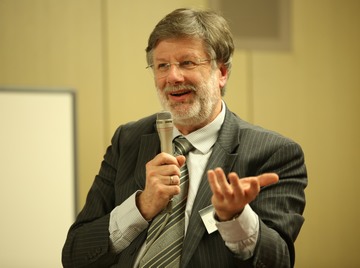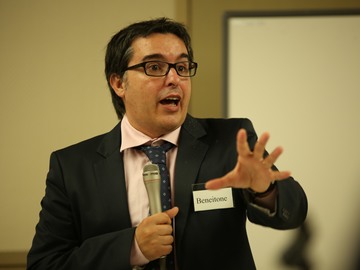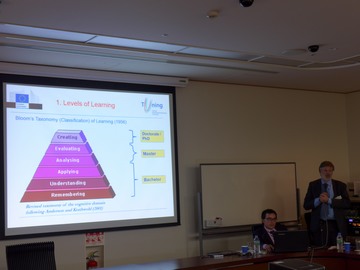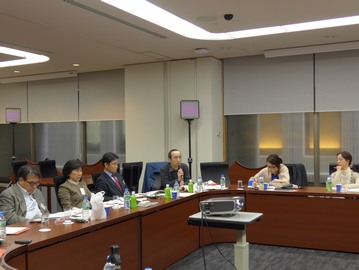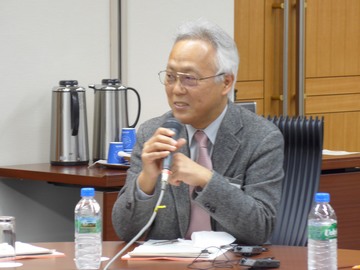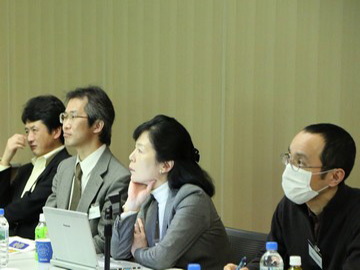アーカイブ

セミナー「グローバル時代における教育課程のモダナイズ」
—国内外の学生を惹きつける高等教育とは—
【日時】
2015年3月19日(木),20日(金) 10:00~16:00【場所】
一橋講堂【講師紹介】
Robert Wagenaar 教授Prof. Robert Wagenaar is Director of the International Tuning Academy of the University of Groningen, The Netherlands. Until recently he was director of Undergraduate and Graduate Studies at the Faculty of Arts of the University of Groningen, being responsible for 15 bachelor and some 35 master programmes. He is also coordinator and director of the Erasmus Mundus Master Course of Excellence Euroculture: Europe in the Wider World. Furthermore, he is a member of the Dutch group of experts for the development of the European Higher Education Area.
Since 2000 he has coordinated - together with Julia Gonzalez and Pablo Beneitone (University of Deusto, Bilbao, Spain) - Tuning Educational Structures, which started as a project to develop international reference points or benchmarks for subject areas as well as an innovative methodology for (re)designing, delivery and enhancing (trans)national student centred degree programmes in the framework of the European Higher Education Area, which has developed into a global process during the last decade.
Pablo Javier Beneitone教授
Pablo Javier Beneitone. Doctor in Social Sciences, FLACSO (Argentina). Also has Master in International Cooperation, Universidad del Salvador (Argentina). Currently he is working as a director at Deusto International Tuning Academy. University of Deusto (Spain). But since 1990s been actively involved in Tuning related projects and programs in Argentina, Spain and widely in Europe. Most recently he was worked as a coordinator in India’s Tuning Feasibility Study.
【セミナーの概要】
一橋大学森有礼高等教育国際流動化センターは、2015年3月19日~20日に、グローバル時代における教育課程のモダナイズ―国内外の学生を惹きつける高等教育とは―と題してセミナーを開催しました。セミナーには、放送大学、関西大学、大阪大学、東京工業大学、東京大学、筑波大学、横浜国立大学、一橋大学の8つの大学から、20人以上の大学教授及び職員が出席しました。今回のセミナーは、Tuning(学習・教授方法や評価の互換性を世界的に促進するプロセス)について、参加者が深く学び情報を共有する機会となりました。セミナーの講師はTuning Academyの代表であるRobert Wagenaar教授(オランダのフローニンゲン大学)とPablo Javier Beneitone教授(スペインのデウスト大学)であり、2日間のセミナーは有益かつ参加者のインスピレーションが刺激されるものでした。
[19日のセミナー内容]質の高い学位プログラムのデザイン
まず、Wagenaar教授がTuningの目的や到達目標は、大学の多様性と自律性の基盤のうえに、教育制度と学習プログラムを調和させることであると説明しました。続いてTuningの方法論や学習成果及びコンピテンスの定義を述べたのちに、大学教育を通じて養成される能力の明確化や学生主体の教育を実施することの重要性について話されました。参加者はTuning及びTuning Academyの機能や役割について明確な情報を得ました。これらプレゼンテーションのタイトルは以下の通りです。
- “The International Tuning Academy Introduced”
- “Tuning: Methodology to Design, Deliver, Maintain and Enhance student centered degree programs”
参加者は、グローバル化時代におけるTuningの必要性、とりわけ日本の高等教育におけるTuningの実施可能性についてオープンな議論を行いました。
次に、Beneitone教授がコンピテンス調査の概要(調査対象者や調査プロセス・結果)について発表しました。ここでは汎用的コンピテンスを国際比較した結果、16のコンピテンスが欧州やアフリカなど4つの地域で共通していたことが示されました。使用された資料は以下の通りです。
- “Presentation of the concepts of Competences. Generic Competences in different context”,
- “From consulting to profiling: some examples of Meta-Profiles”,
- “TUNING Model for Designing, Implementing, Delivering and Enhancing Higher Education Curricula”.
[20日のセミナー内容]質の高い学位プログラムの実施
2日目のセミナーでは、学習と教授方法を取り巻く諸問題、特に教育課程やコースシラバスにおいてコンピテンスや学習成果を明確にし、単位に反映させる方法について学び、オープンなディスカッションを行いました。発表資料は以下の通りです。
- “Consultation process. Practical aspects",
- “Competence Development. Mastery Levels, Indicators and Descriptors”,
- “Teaching, Learning and Assessment in Student-centered degree programs”,
- “Credit and Credit Reference Systems: A world view”,
- “A regional credits system proposal from a Tuning perspective: the CLAR (Latin America Credit system)”.
- コンピテンス調査の結果及び国や大学の特徴によって出る差異
- Tuningを初めてヨーロッパーで導入した際のプロセスおよび問題点と成功事例(Tuningを実施するための必要な措置、Tuningの実践する上で教職員の間の関係の在り方、先進事例&経験)
- 日本での実践可能性や問題点
【その他の配布資料】
Others.zip【セミナーの風景】
